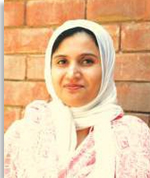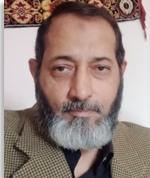| Vision |
|
To create and disseminate globally and locally relevant knowledge, to improve quality of life for people and communities, through effective leadership and management of organizations.
|
| Mission |
|
Keeping in view the vision of IAS our aspiration is to prepare students with complete arena of knowledge, skills, attitude and experiences that will equip them for leadership roles required by the society at large.
|
| Values |
|
1.
|
Merit
|
|
2.
|
Professionalism
|
|
3.
|
Hard Work
|
| 4. |
Discipline
|
|
5.
|
Sensitivity to Diversity
|
|
6.
|
Mutual Respect
|
|
7.
|
Integrity
|
|
8.
|
Civic Behavior
|
|
9.
|
Modesty
|
| 10. |
Team Building
|
| 11. |
Continuous Improvement |
Last Three Year Articles
Year: 2021
1- 2- 3- 4- 5- 6- 7- 8- 9- 10- 11- 12- 13- 14- 15- 16- 17- 18- 19- 20- 21-
Year:
2020
1- 2- 3- 4- 5- 6- 7- 8- 9- 10- 11- 12- Mr. Mubeen Khalid,; Comparative analysis of customer satisfaction & : its effect on financial growth, Journal of Research and Analytical Reviews, 7(1) Y category E-ISSN 2348-1269, P- ISSN 2349-5138 , 2020 13- 14- 15- 16- 17- 18- 19- 20- 21- 22- 23- 24- 25- 26- 27- 28- 29-
Year:
2019
1- 2- 3- 4- 5- 6-
Year:
2014
1- Nasira Jabeen and Iman Saleem and Zafar Iqbal Jadoon,; Governance & Management of third sector organization in Pakistan: Role of Board, Int. Journl of South Asian Studies, 29, 2014 2- Nasira Jabeen and Amani Mozzam,; Politics in academia: A case of university of the Punjab, New Horizons, 8, 2014 3- Nasira Jabeen and Iman Saleem and Zafar Iqbal Jadoon,; Governance & Management of third sector organization in Pakistan: Role of Board, Journal of south asian studies, 29, 2014
Year:
2013
1- Abdu Rashid Jafri,; Public Service Ethic in Pakistan, Public Administration in South Asia, Taylor and Francis Group, 2013 2- Muhamamd Zafar Iqbal Jadoon and Nasira Jabeen,; Administrative Reforms in Pakistan, Public Administration in South Asia, Taylor and Francis Group, 2013 3- Nasira Jabeen and Muhamad Zafar Iqbal Jadoon,; Civil Service system and reforms in Paksitan, Public Administration in South Asia, Taylor and Francis Group, 2013 4- Saleem, M. Saeed A., Ahmad, S. Chaudhry,A,; Measuring extent of autonomy in teaching hospitals of punjab: A Case of Services Hospital, Lahore, European Journal of Business and Management, 5, 2013 5- Kayani, A.K., Ahmad, L. and Saeed, A.,; Perceptions about cultural Globalization in Urban Pakistan, South Asian Studies, 28, 2013 6- Saeed, A,; Governance System of Pakistan: Continuation of Colonial policies, Journal of Political Sciences, 20, 2013 7- Saeed, A. , Ahmad, S,; Qualitative analysis of autonomization of teaching hospitals of Punjab: A Case Study of Jinnah Hospital Lahore, European Journal of Business and Management, 5, 2013 8- Saeed, A.,; Understanding policy making and implementation in Pakistan: A Case of Hospital Automomy Reforms, Public Policy and Administration Research, 3, 2013 9- Saeed, Aamir,; Hospital Autonomy Reforms in Pakistan and the Politics of Meanings, Developing country studies, 3, 2013 10- Saeed, Aamir Ahmad, Shahbaz,; Evaluating the nature and extent of Autonomy in Public Teaching Hospitals: A Case Study of Jinnah Hospital Lahore, Public Policy and Administration Research, 3, 2013 11- Saeed, Aamir,; Devising a qualitative research metholdology for conducting an implementation study in Pakistan: A case of Hospital automony reforms, Public Policy and Administration Research, 3, 2013 12- Saeed, A., Chaudhry, Abdul Qayum. Ahmad, Shahbaz, Ata, Ghalib,; Measuring the impact of empowerment on job satisfaction among the middle level managers of JVC descon Lahore, Public Policy and Administration Research, 3, 2013
Year:
2011
1- Nighat G. Ansari,; Employee Perception of HRMPractices: Impact on Commitment to the organization, South Asian Journal of Management, 18, No. 3, 2011 2- Ghalib Ata & Nasira Jabeen ,; CEO Commitment and Organizational Innovativeness: A study of Pakistan’s Export Organizations , Pakistan Economic and Social Review, 49 No. 2, 2011 3- Amani Moazam Baig Mirza
&Prof. Dr. Nasira Jabeen,; Gender Stereotypes and Women, South Asian Studies, 26 No.2, 2011
Year:
2010
1- Mohammad Zafar Iqbal
Nasira Jabeen,; Public Admin. Education in Pakistan, Pakistan Vision, II, 2010
Year:
1-
|
•
|
Jabeen, N., & Jadoon, M. (2017). Urbanization in Pakistan: A Governance Perspective. Journal of The Research Society Of Pakistan , 54 (1).
|
|
•
|
Mubasher, U. F., Salman, Y., Irfan, S., Jabeen, N. (2017). Spiritual leadership in organizational context. A Research Journal of South Asian Studies, 32(1)
|
|
•
|
Naveed, S., Salman, Y., Jadoon, I., Zafar, M., Jabeen, N., & Rana, N. S. (2017). Inside state enterprises: Symbolic compliance to modern HRM as a response to contradictory institutional logics. Abasyn University Journal of Social Sciences , 10 (1).
|
|
•
|
Jabeen, N. (2017). Gender and Local Governance in Pakistan In Gender and Local Governance in Pakistan, Women in Governing Institutions in South Asia
|
|
•
|
Ansari, N. (2017). Women in Pakistan Civil Service In Gender and Local Governance in Pakistan, Women in Governing Institutions in South Asia
|
|
•
|
Irfan, S, Salman, Y., Jabeen, N., Imran, S., Ansari, N. (2017). Towards understanding relational aspect of inter organizational collaboration. Pakistan Economic and Social Revie.55(1):53-79
|
|
•
|
Ansari, N. (2017). The impact of job Impact of job stress on job performance with perceived organizational support as a moderator. Governance and Management Review
|
|
•
|
Ansari, N. (2017). The effect of financial compensation and perceived career progression on employee turnover intentions. Governance and Management Review
|
|
•
|
Irfan, S., & Nutley, S. (2017). New development: Turning around failing schools—lessons from Lahore. Public Money & Management , 37 (1), 69-74.
|
|
•
|
Rathore, K. (2017). Trends of higher education among female students. Governance and Management Review
|
|
•
|
Moazzam, A (2017).The Influence of participative Management on organizational commitment. Governance and Management Review
|
|
•
|
Jabeen, N., Jadoon, Z. I., & Salman, Y. (2016). Revisiting Public Policy Making Process and Strategies in Pakistan: A Governance Perspective. South Asian Studies , 31 (2), 17.
|
|
•
|
Hanif, A., Jabeen, N., & Jadoon, Z. I. (2016). Performance Management in Public Sector: A Case of Civil Service in Pakistan. South Asian Studies , 31 , 1.
|
|
•
|
Ansari, N., Jabeen, N., Moazzam, A. & Salman, Y. (2016). Gender and perceptions of organizational justice: A study of University of the Punjab. Pakistan Journal of Women's Studies= Alam-e-Niswan= Alam-i Nisvan , 23 (1), 45. |
|
•
|
Ansari, N., Jabeen, N. & Moazzam. (2016). A Respectable Femininity and career advancement: An analysis of the Federal Civil service of Pakistan. Journal of Social Science and Humanities,24(1) |
|
•
|
Jabeen, N. (2016). Recruitment and selection practices of faculty in higher education institutions of Pakistan: A case of University of the Punjab. Journal of Research society of Pakistan.53(1). |
|
•
|
Ansari, N., Jabeen, N., Baig, A. M., & Salman, Y. (2016). Diversity Management: Towards a Theory of Gender Sensitive Practices. Bulletin of Education and Research , 38 (2). |
|
•
|
Shahid, R., Jabeen, N., & Ansari, N. (2016). ACADEMIC Self Concept Academic Achievement Among Undergraduates In Universities of Pakistan: A Gender Perspective. The Sindh University Journal of Education-Suje , 45 (1) |
|
•
|
Dar, S., Jabeen, N., Jadoon, Z. I., & Dar, I. S. (2016). Faculty Development Programs and Their Effect on Individual and Organizational Performance in Pakistan. Pakistan Vision , 17 (2) |
|
•
|
Khalil, M., Jabeen, N., Jadoon, Z. I., & Salman, Y. (2016). Female Expatriates And Cross Cultural Adjustment: A Study Of Saudi Arabia. Pakistan Journal of Women's Studie. Alam-e-Niswan, 23 (2), 45. |
|
•
|
Moazzam, A., Jabeen, N., Ansari, N. G. & Salman,Y. (2015). Mentoring, Networking and Politicking in Higher Education Institutions: A Gendered Perspective. Global Management Journal for Academic & Corporate Studies , 5(2): 41-48 |
|
•
|
Rahatulain, Jabeen N., Jadoon, Z. & Paul Z. (2015). Public Service Motivation and Big Five Personality Traits: The Case of Provincial Services of Pakistan, Journal of Research (Humanities) , LI: 91-114 |
|
•
|
Qadar, S., Moazzam,A. & Ansari, G.(2015). E-Tax Website Quality: An Evaluation Framework. Pakistan Journal of Information Management & Libraries, 16: 38-48 |
|
•
|
Zubair, S. S., Jabeen, N., & Zahid, M. (2015). Evaluation of Tenure Track system in higher Education institutions of Pakistan: An HRM Perspective. New Horizons , 9 (2), 29. |
|
•
|
Qasim, N., Jabeen, N., Jadoon, Z., & Dar, I. S. (2015). Governance and Management of Higher Education Institutions In Pakistan: A Case Of Lahore College For Women University. Global Management Journal for Academic & Corporate Studies , 5 (1), 54. |
|
•
|
Mubasher, U. F., Baig, A. M., & Ansari, N. (2015). Employee religiosity: impact on Job stress and Job satisfaction. New Horizons , 9 (2), 1. |
|
•
|
Asif, A., Ansari, N., & Rathore, K. (2015). Empirical Relationship of Big Five Personality Traits and Affective Commitment Among the Public Sector Employees. International Journal of Management Sciences and Business Research . |
|
•
|
Rehman, H., Moazzam, A., & Ansari, N. (2015). Role of Microfinance Institutions in Women Empowerment: A Case Study of Akhuwat, Pakistan. South Asian Studies , 30 (1), 107. |
|
•
|
Jabeen, N., Qamar, U., & Ansari, N. (2014). Workplace spirituality and affective commitment among Employees: a case study of Akhuwat. Journal of Business Strategies , 8 (2), 39. |
|
•
|
Jabeen, N., & Moazzam, A. (2014). Politics in Academia: A Case of the University of The Punjab. New Horizons , 8 (2), 65. |
|
•
|
Jabeen, N. (2014). Gender Equity and Governance in Pakistan: An Organizational Justice Perspective. Journal of Applied Environmental, Biological Science, 4(9S): 395-402 |
|
•
|
Rathore, A. H., & Rathore, K. (2014). State of Health: Assessment in Pakistani labor force in Gulf States. The Professional Medical Journal, 2(5):925-928 |
|
•
|
Bukhari, I. S., Jabeen, N., & Jadoon, Z. I. (2014). Governance of Third Sector Organizations in Pakistan: The Role of Advisory Board. South Asian Studies , 29 (2), 583. |
|
•
|
Jafri, A. R., & Faisal, F. (2014). Problems and Prospects of Good Governance in Pakistan. New Horizons , 8 (2), 81. |
|
•
|
Jabeen, N., & Jadoon, M. Z. I. (2013). Civil Service System and Reforms in Pakistan. In Public Administration in South Asia: India, Bangladesh, and Pakistan (pp. 453-468). CRC Press. |
|
•
|
Jabeen, N., & Jadoon, M. Z. I. (2013). Administrative Reform in Pakistan. In Public Administration in South Asia : India, Bangladesh, and Pakistan . CRC Press. |
|
|
|
National Conference 2016
|
| 2016 marked a new milestone in the history and achievements of IAS as it hosted its first National conference on “Emerging trends in Governance and Management in Pakistan” on 20-21st May 2016 at Crystal Hall, Pearl Continental Hotel. The conference boasted of prominent Keynote speakers namely: |
|
•
|
Dr. Ishrat Hussain, Professor Emeritus, IBA Karachi
|
|
•
|
Prof. Dr. M. Nizamuddin, Chairman Punjab Higher Education Commission
|
|
•
|
Dr. Nadeem ul Haq, Former Deputy Chairman, Planning Commission
|
|
•
|
Prof. Dr. Mehtab Kareem, Research Professor, School of Public Policy, George Mason University, USA
|
|
•
|
Prof. Dr. Zafar Iqbal Jadoon, Professor, UCP Business School, University of Central Punjab
|
|
•
|
Dr. Syed Tahir Hijazi, Member (Governance & Reforms), Planning Commission
|
|
•
|
Dr. Muhammad Amjad Saqib, Executive Director, Akhuwat Foundation
|
| The conference was spread over three days with parallel sessions and panel discussions. The primary objective of the conference was to bring together academics, professionals, practitioners and students to promote knowledge transfer, take stock of the emerging trends in the fields of governance and management in Pakistan. It provided a platform to those actively engaged in research and practice in the field, to share their research findings and contribute to theoretical development of the discipline in light of the contextual realities of developing countries. The conference not only provided a forum to researchers to share their research findings but also to act as a networking tool that may result in mutually beneficial research collaborations. |
| Around 120 papers were received for presentation of which only 42 papers were accepted and presented after peer review from all across Pakistan. Submissions from all the relevant areas which aligned with the overall theme were received namely, |
|
•
|
Human Resource Management
|
|
•
|
Governance (e.g. network governance, university governance, corporate governance, local/national/global governance, institutional governance, gender & governance, e-governance)
|
|
•
|
Public Policy & Implementation
|
|
•
|
International Development
|
|
•
|
Third Sector Management
|
|
•
|
Marketing in public, private and non-profit organisations
|
|
•
|
Public Service Motivation, Trust & Leadership
|
|
•
|
Corporate Social Responsibility
|
|
•
|
Public sector reform (e.g., education, health services, taxation, local government and energy sector reforms etc).
|
|
Representation of academicians from all over Pakistan was one of the hallmarks of the conference. The conference led to the following outcomes:
|
|
•
|
Provided an opportunity to postgraduate research students to present their research and get feedback at the PhD Colloquium
|
|
•
|
Aided knowledge transfers among academia, professionals, practitioners and industry leading to collaborations, that are underway.
|
|
•
|
Provided an opportunity to academics and research students to promote indigenous research and helped us in promoting research culture in social sciences
|
|
•
|
An indigenous body of knowledge in the fields of governance and management grounded in the contextual realities of Pakistan evolved.
|
| The conference precluded a full-day colloquium for PhD Students in the field of management to share and discuss their thesis ideas and preliminary research. The colloquium was limited to 35 students, who submitted their work earlier to be reviewed by several senior faculty members. It provided the doctoral researchers with an exciting opportunity to present their work-in-progress, and receive feedback from peers, and distinguished academicians, as well as to network with other PhD scholars. The mentors that were part of the colloquium were leading academicians in their relevant fields and active researchers. |
Business, Economics and Administrative Sciences
|

 B.S. Management (Regular)
B.S. Management (Regular)
 B.S. Management (Self-Supporting & Evening)
B.S. Management (Self-Supporting & Evening)
 BS Management 5th Semester - Lateral Entry (Regular, Self-Supporting & Evening)
BS Management 5th Semester - Lateral Entry (Regular, Self-Supporting & Evening)
 Master of Public Administration (Regular & Self-Supporting)
Master of Public Administration (Regular & Self-Supporting)
 MS Human Resource Management (18 Years) (Regular & Self-Supporting)
MS Human Resource Management (18 Years) (Regular & Self-Supporting)
 MS Health Administration (18 years) (Self-Supporting)
MS Health Administration (18 years) (Self-Supporting)
 MPhil Management (Regular Program/Self-Supporting Afternoon Program)
MPhil Management (Regular Program/Self-Supporting Afternoon Program)
 PhD in Administrative Sciences
PhD in Administrative Sciences

























